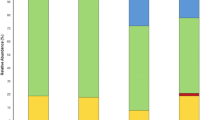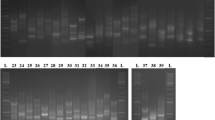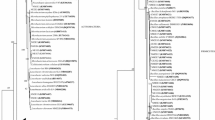Abstract
Plant communities growing in metal-contaminated areas can develop resistance mechanisms by establishing symbiotic associations with endophytic microorganisms. The functionality and diversity of endophytic communities depend on the amount and type of metal present in the soil. To characterise the response of endophytic bacterial communities to mercury-induced abiotic stress, we analysed the colonization frequency and number of bacterial isolates in the roots of Aeschynomene fluminensis (Joint Vetch) and Polygonum acuminatum (Smartweed), which represent the families Fabaceae and Polygonaceae, respectively. These two plant species are found in many mercury-contaminated areas. The isolates were characterised by morpho- and genotyping and identified by 16S rDNA gene sequencing. The bacteria belonged to the phyla Actinobacteria, Bacteriodetes, Firmicutes, and Proteobacteria. The Hill series and Venn diagram provided evidence that mercury affects the composition, diversity, and richness of the endophytic bacterial communities. Inoculation with Bacillus_sp_BacI34, Burkholderia_sp_BacI45, Enterobacter_sp_BacI14, Enterobacter_sp_BacI26, Enterobacter_sp_BacI18, Klebsiella_pneumoniae_BacI20, Lysobacter_soli_BacI39, Pantoea_sp_BacI16, and Pantoea_sp_BacI23 promoted the growth of corn (Zea mays) plants in mercury-supplemented substrata. It is noteworthy that Pantoea sp_BacI23 increased the host plant length (root and shoot) by 117.09 ± 0.28%. Endophytic bacterial strains may well provide important inoculants for plant growth promotion on metal-contaminated sites and in metal bioremediation programs.




Similar content being viewed by others
References
Afzal S, Begum N, Zhao H, Fang Z, Lou L, Cai Q (2017) Influence of endophytic root bacteria on the growth cadmium tolerance and uptake of switchgrass (Panicum virgatum L.). J Appl Microbiol 123:498–510. https://doi.org/10.1111/jam.13505
Alanoca L, Amouroux D, Monperrus M, Tessier E, Goni M (2016) Diurnal variability and biogeochemical reactivity of mercury species in an extreme high-altitude lake ecosystem of the Bolivian Altiplano. Environ Sci Pollut Res 23:6919–6933. https://doi.org/10.1007/s11356-015-5917-1
Almoneafy AA, Kakar KU, Nawaz Z, Li B, Chun-lan Y, Xie GL (2014) Tomato plant growth promotion and antibacterial related-mechanisms of four rhizobacterial Bacillus strains against Ralstonia solanacearum. Symbiosis 63:59–70. https://doi.org/10.1007/s13199-014-0288-9
Alvares CA, Stape JL, Sentelhas PC, De Moraes Gonçalves JL, Sparovek G (2013) Kooppen’s climate classification map for Brazil. Meteorol Zeitschrift 22:711–728. https://doi.org/10.1127/0941-2948/2013/0507
Asaduzzaman A, Riccardi D, Afaneh AT, Cooper SJ, Smith JC, Wang F, Schreckenbach G (2019). Environmental mercury chemistry–in silico. Acc Chem Res. 52(2):379-388. https://doi.org/10.1021/acs.Accounts.8b00454
Bastian M, Heymann S, Jacomy M (2009) Gephi: an open source software for exploring and manipulating networks. Paper Presented at the International AAAI Conference on Weblogs and Social Media AAAI 8:361–362
Blondel VD, Guillaume JL, Lambiotte R, Lefebvre E (2008) Fast unfolding of communities in large networks. J Stat Mech Theory Exp 10:P10008. https://doi.org/10.1088/1742-5468/2008/10/P10008
Brasil, Ministerio de Meio Ambiente. Comissão Nacional do Meio Ambiente, Conama. Resolução 420 - Estabelecimento de valores orientadores para elementos-traço em solos e água subterrânea. Brasília, 2009. http://www.mma.gov.br/port/conama/legiabre.cfm?codlegi=620/. Accessed 10 October 2018
Cabral L, Giovanella P, Gianello C, Bento FM, Andreazza R, Camargo FAO (2013) Isolation and characterization of bacteria from mercury contaminated sites in Rio Grande do Sul, Brazil, and assessment of methylmercury removal capability of a Pseudomonas putida V1 strain. Biodegradation 24:319–331. https://doi.org/10.1007/s10532-012-9588-z
Carrasco-Gil S, Siebner H, Leduc DL, Webb SM, Milla R, Andrews JC, Hernández LE (2013) Mercury localization and speciation in plants grown hydroponically or in a natural environment. Environ Sci Technol 47(7):3082–3090. https://doi.org/10.1021/es303310t
Carrim AJI, Barbosa EC, Vieira JDG (2006) Enzymatic activity of endophytic bacterial isolates of Jacaranda decurrens Cham. (Carobinha-do-campo). Braz Arch Biol 49:353–359. https://doi.org/10.1590/S1516-89132006000400001
Cavalcante VA, Dobereiner J (1988) A new acid-tolerant nitrogen-fixing bacterium associated with sugarcane. Plant Soil 108:23–31. https://doi.org/10.1007/BF02370096
Cebalho EC, Díez S, Santos Filho M, Muniz CC, Lázaro W, Malm O, Ignácio ARA (2017) Effects of small hydropower plants on mercury concentrations in fish. Environ Sci Pollut Res 24:22709–22716. https://doi.org/10.1007/s11356-017-9747-1
Ceccatto AP, Testoni MC, Ignácio AR, Santos-Filho M, Malm O, Díez S (2016) Mercury distribution in organs of fish species and the associated risk in traditional subsistence villagers of the Pantanal wetland. Environ Geochem Health 38(3):713–722. https://doi.org/10.1007/s10653-015-9754-4
Cuzzi C, Link S, Vilani A, Onofre SB (2011) Enzimas extracelulares produzidas por fungos endofíticos isolados de Baccharis Dracunculifolia DC (Asteraeceae). Glob Sci Technol 4:47–57 ISSN 1984-3801
da Costa PB, Granada CE, Ambrosini A, Moreira F, De Souza R, Dos Passos JFM, Arruda L, Passaglia LMP (2014) A model to explain plant growth promotion traits: a multivariate analysis of 2,211 bacterial isolates. PLoS One 9:1–25. https://doi.org/10.1371/journal.pone.0116020
Darko G, Azanu D, Logo NK (2016) Accumulation of toxic metals in fish raised from sewage-fed aquaculture and estimated health risks associated with their consumption. Cogent Environ Sci 2:1–37. https://doi.org/10.1080/23311843.2016.1190116
de Souza LT, Cnossen-Fassoni A, Pereira OL, Mizubuti ESG, de Araújo EF, de Queiroz MV (2013) Novel and highly diverse fungal endophytes in soybean revealed by the consortium of two different techniques. J Microbiol 51:56–69. https://doi.org/10.1007/s12275-013-2356-x
Dixit R, Wasiullah E, Malaviya D, Pandiyan K, Singh U, Sahu A, Shukla R, Singh B, Rai J, Sharma P, Lade H, Paul D (2015) Bioremediation of heavy metals from soil and aquatic environment: an overview of principles and criteria of fundamental processes. Sustainability 7:2189–2212. https://doi.org/10.3390/su7022189
Duarte GSD, Pasa MC (2016) Agricultural biodiversity and ethnobotany at São Benedito community Poconé, Mato Grosso, vol 17. Interações (Campo Grande), Brazil, pp 247–256. https://doi.org/10.20435/1984042X2016208
Durand A, Maillard F, Alvarez-lopez V, Guinchard S, Bertheau C, Valot B, Blaudez D, Chalot M (2018) Bacterial diversity associated with poplar trees grown on a hg-contaminated site: community characterization and isolation of hg-resistant plant growth-promoting bacteria. Sci Total Environ 622:1165–1177. https://doi.org/10.1016/jscitotenv201712069
El-deeb B, Gherbawy Y, Hassan S (2012) Molecular characterization of endophytic bacteria from metal hyperaccumulator aquatic plant (Eichhornia crassipe) and its role in heavy metal removal. Geomicrobiol J 29(10):906–915. https://doi.org/10.1080/014904512011635764
Farias L, Fávaro DIT, Pessoa A, Aguiar JPL, Yuyama LKO (2012) Mercury and methylmercury concentration assessment in children’s hair from Manaus, Amazonas state, Brazil. Acta Amaz 42:279–286. https://doi.org/10.1590/S0044-59672012000200015
Fidalgo C, Henriques I, Rocha J, Tacão M, Alves A (2016) Culturable endophytic bacteria from the salt marsh plant Halimione portulacoides: phylogenetic diversity, functional characterization, and influence of metal(loid) contamination. Environ Sci Pollut Res 23:10200–10214. https://doi.org/10.1007/s11356-016-6208-1
Franchi E, Rolli E, Marasco R, Agazzi G, Borin S, Cosmina P, Pedron F, Rosellini I, Barbafieri M (2017) Phytoremediation of a multi contaminated soil: mercury and arsenic phytoextraction assisted by mobilizing agent and plant growth promoting bacteria. J Soils Sediments 17(5):1224–1236. https://doi.org/10.1007/s11368-015-1346-5
Gaiero JR, McCall CA, Thompson KA, Day NJ, Best AS, Dunfield KE (2013) Inside the root microbiome: bacterial root endophytes and plant growth promotion. Am J Bot 100:1738–1750. https://doi.org/10.3732/ajb.1200572
Glick BR (2015) Stress control and acc deaminase. Princ Plant-Microbe Interact Microbes Sustain Agric:257–264. https://doi.org/10.1007/978-3-319-08575-3_27
Gu Y, Wang Y, Sun Y, Zhao K, Xiang Q, Yu X, Chen Q (2018) Genetic diversity and characterization of arsenic-resistant endophytic bacteria isolated from Pteris vittata, an arsenic hyperaccumulator. BMC Microbiol 18:1–42. https://doi.org/10.1186/s12866-018-1184-x
Hardoim PR, van Overbeek LS, van Elsas JD (2008) Properties of bacterial endophytes and their proposed role in plant growth. Trends in microbiol 16(10):463–471. https://doi.org/10.1016/j.tim.2008.07.008
Harichová J, Edita K, Pangallo D, Peter F (2012) Structure analysis of bacterial community and their heavy-metal resistance determinants in the heavy-metal-contaminated soil sample. Biologia 67(6):1038–1048. https://doi.org/10.2478/s11756-012-0123-9
Harris RF, Sommers LE (1968) Plate-dilution frequency technique for assay of microbial. Ecology Appl Microbiol 16:330–334 ISSN: 0099-2240
Hill MO (1973) Diversity and evenness: a unifying notation and its consequences. Ecology 54:427–432. https://doi.org/10.2307/1934352
Hoagland DR, Arnon DI (1950) The water-culture method for growing plants without soils. Circular. Calif Agric Exp Stn 347(2nd edit)
Jha PN, Gupta G, Jha P, Mehrotra R (2013) Association of rhizospheric / endophytic bacteria with plants: a potential gateway to sustainable agriculture. Greener J Agric Sci 3:73–84
Jiao S, Chen W, Wang E, Wang J, Liu Z, Li Y (2016) Microbial succession in response to pollutants in batch-enrichment culture. Nat Publ Gr:1–11. https://doi.org/10.1038/srep21791
Junk WJ, Piedade MTF, Lourival R, Wittmann F, Kandus P, Lacerda LD, Bozelli RL, Esteves FA, Nunes da Cunha C, Maltchik L, Schöngart J, Schaeffer-Novelli Y, Agostinho AA (2014) Brazilian wetlands: their definition, delineation, and classification for research, sustainable management, and protection. Aquat Conserv Mar Freshw Ecosyst 24:5–22. https://doi.org/10.1002/aqc2386
Junk WJ, Piedade MT, Schoengart J, Wittmann F, da Cunha CN (2016) Brazilian wetlands: classification The Wetland Book: I: Structure and Function. Management and Methods:1–7. https://doi.org/10.1007/978-94-007-6172-8_333-1
Köppen W (1930) Geiger R Handbuch der klimatologie. Berlin, Gebrüder Borntraeger
Lacerda LD, Pfeiffer WC, Marins RV, Rodrigues S, Souza CMM, Bastos WR (1991) Mercury dispersal in water, sediments and aquatic biota of a gold mining tailing deposit drainage in Poconé Brazil. Water Air Soil Pollut 55:283–294. https://doi.org/10.1007/BF00211194
Lane DJ (1991) 16S/23S rRNA sequencing. In: Stachebrandt E, Goodfellow M (eds) Nucleic acid techniques in bacterial systematics. Wiley, Chichester
Long XE, Yao H, Huang Y, Wei W, Zhu YG (2018) Phosphate levels influence the utilisation of rice rhizodeposition carbon and the phosphate-solubilising microbial community in a paddy soil. Soil Biol Biochem 118:103–114. https://doi.org/10.1016/j.soilbio.2017.12.014
Lorck H (1948) Veterinary R. Production of hydrocyanic acid by bacteria Physiologia Plantarum 1:1–6. https://doi.org/10.1111/j1399-30541948tb07118x
Luo SL, Chen L, Chen JL, Xiao X, Xu TY, Wan Y, Rao C, Liu CB, Liu YT, Lai C (2011) Zeng GM. Analysis and characterization of cultivable heavy metal-resistant bacterial endophytes isolated from Cd-hyperaccumulator Solanum nigrum L and their potential use for phytoremediation Chemosphere 85:1130–1138. https://doi.org/10.1016/jchemosphere201107053
Maida I, Chiellini C, Mengoni A, Bosi E, Firenzuoli F, Fondi M, Fani R (2015) Antagonistic interactions between endophytic cultivable bacterial communities isolated from the medicinal plant Echinacea purpurea. Environ Microbiol 18(8):2357–2365. https://doi.org/10.1111/1462-292012911
Mallon CA, Van Elsas JD, Salles JF (2015) Microbial invasions: the process, patterns, and mechanisms trends. Microbiol 23:719–729. https://doi.org/10.1016/jtim201507013
Mani D, Kumar C (2014) Biotechnological advances in bioremediation of heavy metals contaminated ecosystems: an overview with special reference to phytoremediation international journal of environ Sci Technol 11(3):843–872. https://doi.org/10.1007/s13762-013-0299-8
Manohari R, Yogalakshmi KN (2016) Optimization of copper (II) removal by response surface methodology using root nodule endophytic bacteria isolated from Vigna unguiculata. Water, Air, & Soil Pollution 227-285. https://doi.org/10.1007/s11270-016-2964-2
Maropola MKA, Ramond JB (2015) Trindade M. Impact of metagenomic DNA extraction procedures on the identifiable endophytic bacterial diversity in Sorghum bicolor (L Moench) J Microbiol Methods 112:104–117. https://doi.org/10.1016/jmimet201503012
Mathew DC, Ho YN, Gicana RG, Mathew GM, Chien MC, Huang CC (2015) A rhizosphere-associated symbiont, Photobacterium spp strain MELD1, and its targeted synergistic activity for phytoprotection against mercury. PLoS One 10:1–18. https://doi.org/10.1371/journalpone0121178
Meng X, Bertani I, Abbruscato P, Piffanelli P, Licastro D, Wang C, Venturi V (2015) Draft genome sequence of rice endophyte-associated isolate Kosakonia oryzae KO348. Genome Announc 3:2164. https://doi.org/10.1128/genomeA00594-15
Mesa V, Navazas A, González-Gil R, González A, Weyens N, Lauga B, Gallego JLR, Sánchez J (2017) Use of endophytic and rhizosphere bacteria to improve phytoremediation of arsenic-contaminated industrial soils by autochthonous Betula celtiberica. Appl Env Microbiol 83:e03411–e03416. https://doi.org/10.1128/AEM03411-16
Milagres AMF, Machuca A, Napoleao D (1999) Methods detection of siderophore production from several fungi and bacteria by a modification of chrome azurol S (CAS) agar plate assay. J Microbiol Methods 37:1–6. https://doi.org/10.1016/S0167-7012(99)00028-7
Mosa KA, Saadoun I, Kumar K, Helmy M, Dhankher OP (2016) Potential biotechnological strategies for the cleanup of heavy metals and metalloids. Front Plant Sci 7:303. https://doi.org/10.3389/fpls201600303
Naik MM, Dubey SK (2016) Marine pollution and microbial remediation springer https://doi.org/10.1007/978-981-10-1044-6
Nieboer E, Richardson DHS (1980) The replacement of the nondescript term ‘heavy metals’ by a biologically and chemically significant classification of metal ions. Environmental Pollution Series B, Chemical and Physical 1 (1):3-26
Oliveira KF, Lacerda LD, Peres TF, Bezerra MF, da Silva Dias FJ (2015) Emission factor and balance of mercury in fish farms in an artificial reservoir in NE Brazil. Environ Sci Pollut Res 22:18278–18287. https://doi.org/10.1007/s11356-015-5102-6
Pandey PK, Samanta R, Narain R, Yadav S (2015) Plant beneficial endophytic bacteria from the ethnomedicinal Mussaenda roxburghii (Akshap) of eastern Himalayan Province, India Hindawi Publ Corp ID 580510:1–8. https://doi.org/10.1155/2015/580510
Pereira SIA, PML C (2014) Diversity and characterization of culturable bacterial endophytes from Zea mays and their potential as plant growth-promoting agents in metal-degraded soils. Environ Sci Pollut Res Int 21:14110–14123. https://doi.org/10.1007/s11356-014-3309-6
Pérez A, Martínez D, Barraza Z, Marrugo J (2016) Bacterias endófitas asociadas a los géneros Cyperus y Paspalum en suelos contaminados con mercurio Revista UDCA. Actualidad Divulgación Científica 19(1):67–76 ISSN 0123-4226
Pietro-Souza W, Mello IS, Vendruscullo SJ, GFd S, CNd C, White JF, Soares MA (2017) Endophytic fungal communities of Polygonum acuminatum and Aeschynomene fluminensis are influenced by soil mercury contamination. PLoS ONE 12:e0182017. https://doi.org/10.1371/journalpone0182017
Podile A, Kishore G (2007) Plant growth-promoting rhizobacteria Gnanamanickam SS plant-associated Bact springer, Netherlands, pp 195–230. https://doi.org/10.1094/Phyto-71-642
Rodriguez RJ, Henson J, van Volkenburgh E, Hoy M, Wright L, Beckwith F, Redman RS (2008) Stress tolerance in plants via habitat-adapted symbiosis. The ISME journal 2(4):404–416. https://doi.org/10.1038/ismej2007106
Román-Ponce B, Ramos-Garza J, Vásquez-Murrieta MS, Rivera-Orduña FN, Chen WF, Yan J, Estrada-de los Santos P, Wang ET (2016) Cultivable endophytic bacteria from heavy metal(loid)-tolerant plants. Arch Microbiol 198:941–956. https://doi.org/10.1007/s00203-016-1252-2
Sánchez-López AS, Thijs S, Beckers B, González-Chávez MC, Weyens N, Carrillo-González R, Vangronsveld J (2018) Community structure and diversity of endophytic bacteria in seeds of three consecutive generations of Crotalaria pumila growing on metal mine residues. Plant Soil 422:51–66. https://doi.org/10.1007/s11104-017-3176-2
Schulz B, Boyle C (2005) The endophytic continuum. Mycol Res 109:661–686. https://doi.org/10.1017/S095375620500273X
Seccatore J, Veiga M, Origliasso C, Marin T, De Tomi G (2014) An estimation of the artisanal small-scale production of gold in the world. Sci Total Environ 496:662–667. https://doi.org/10.1016/jscitotenv201405003
Shen M, Liu L, Li D, Zhou W, Zhou Z, Zhang C, Luo Y, Wang H, Li H (2013) The effect of endophytic Peyronellaea from heavy metal-contaminated and uncontaminated sites on maize growth, heavy metal absorption and accumulation fungal. Ecol 6:539–545. https://doi.org/10.1016/jfuneco201308001
Shinwari KI, Shah AU, Afridi MI, Zeeshan M, Hussain H, Hussain J, Ahmad O (2015) Application of plant growth promoting rhizobacteria in bioremediation of heavy metal polluted soil. Asian J Multidisc Stud 3(4):179–185
Soares MA, Li H, Bergen M, Manoel J, Kowalski KP, White JF (2016a) Functional role of an endophytic Bacillus amyloliquefaciens in enhancing growth and disease protection of invasive English ivy (Hedera helix L) Plant Soil 405(1-2):107–123. https://doi.org/10.1007/s11104-015-2638-7
Soares MA, Li HY, Kowalski KP, Bergen M, Torres MS, White JF (2016b) Functional role of bacteria from invasive Phragmites australis in promotion of host growth. Microb Ecol 72:407–417. https://doi.org/10.1007/s00248-016-0793-x
Soares MA, Li HY, Kowalski KP, Bergen M, Torres MS, White JF (2016c) Evaluation of the functional roles of fungal endophytes of Phragmites australis from high saline and low saline habitats. Biol Invasions 18:2689–2702. https://doi.org/10.1007/s10530-016-1160-z
Stegen JC, Lin X, Konopka AE, Fredrickson JK (2012) Stochastic and deterministic assembly processes in subsurface microbial communities. ISME J 6:1653–1664. https://doi.org/10.1038/ismej201222
Sun L, Zhang Y, He L, Chen Z, Wang Q, Qian M, Sheng X (2010) Genetic diversity and characterization of heavy metal-resistant-endophytic bacteria from two copper-tolerant plant species on copper mine wasteland. Bioresour Technol 101:501–509. https://doi.org/10.1016/jbiortech200908011
Tanaka T, Kawasaki K, Daimon S, Kitagawa W, Yamamoto K, Tamaki H, Kamagata Y (2014) A hidden pitfall in the preparation of agar media undermines microorganism cultivability. Appl Environ Microbiol 80(24):7659–7666. https://doi.org/10.1128/AEM.02741-14
Teixeira LC, Peixoto RS, Cury JC, Sul WJ, Pellizari VH, Tiedje J, Rosado AS (2010) Bacterial diversity in rhizosphere soil from Antarctic vascular plants of Admiralty Bay, maritime Antarctica. ISME J 4:989–1001. https://doi.org/10.1038/ismej201035
Ullah A, Heng S, Munis MFH, Fahad S, Yang X (2015) Phytoremediation of heavy metals assisted by plant growth promoting (PGP) bacteria: a review. Environ Exp Bot 117:28–40. https://doi.org/10.1016/jenvexpbot201505001
Vandamme P, Giesendorf BAJ, Van Belkum A, Pierard D, Lauwers S, Kersters K, Butzler J-P, Goossens H, Quint WGV (1993) Discrimination of epidemic and sporadic isolates of Arcobacter butzleri by polymerase chain reaction-mediated DNA fingerprinting. J Clin Microbiol 31:3317–3319 0095-1137/93/123317-03$02.00/0
Vishnivetskaya TA, Mosher JJ, Palumbo AV, Yang ZK, Podar M, Brown SD, Brooks SC, Gu B, Southworth GR, Drake MM, Brandt CC, Elias DA (2011) Mercury and other heavy metals influence bacterial community structure in contaminated Tennessee streams. J Appl Environ Microbiol 77:302–311. https://doi.org/10.1128/AEM01715-10
White JF, Torres MS, Johnson H, Irizarry I, Tadych M (2014) A functional view of plant microbiomes: endosymbiotic systems that enhance plant growth and survival in: Verma V, Gange a (eds) advances in endophytic research 425-439 springer. New Delhi. https://doi.org/10.1007/978-81-322-1575-2_21
Xie P, Hao X, Herzberg M, Luo Y, Nies DH, Wei G (2015) Genomic analyses of metal resistance genes in three plant growth promoting bacteria of legume plants in northwest mine tailings. China J Environ Sci (China) 27:179–187. https://doi.org/10.1016/jjes201407017
Yu Z, Li J, Li Y, Wang Q, Zhai X, Wu G, Liu P, Li X (2014) A mer operon confers mercury reduction in a Staphylococcus epidermidis strain isolated from Lanzhou reach of the Yellow River. Int Biodeterior Biodegrad 90:57–63. https://doi.org/10.1016/jibiod201402002
Zhang Y, Liu J, Zhou Y, Gong T, Wang J, Ge Y (2013) Enhanced phytoremediation of mixed heavy metal (mercury)-organic pollutants (trichloroethylene) with transgenic alfalfa co-expressing glutathione S-transferase and human P450 2E1. J Hazard Mater 260:1100–1107. https://doi.org/10.1016/jjhazmat201306065
Zhang MQ, Guo Y, Powell CA, Doud MS, Yang CY, Zhou H, Duan YP (2016) Zinc treatment increases the titre of “Candidatus Liberibacter asiaticus” in huanglongbing-affected citrus plants while affecting the bacterial microbiomes. J Appl Microbiol 120:1616–1628. https://doi.org/10.1111/jam13102
Funding
This work was supported by grants from Conselho Nacional de Desenvolvimento Científico e Tecnológico (CNPq, grant 409,062/2018–9) and Fundação de Amparo à Pesquisa do Estado de Mato Grosso (FAPEMAT, grant 568,258/2014) to Marcos Antônio Soares, Ph.D.
Author information
Authors and Affiliations
Corresponding author
Additional information
Publisher’s note
Springer Nature remains neutral with regard to jurisdictional claims in published maps and institutional affiliations.
Electronic supplementary material
ESM 1
(DOCX 55 kb)
Rights and permissions
About this article
Cite this article
Mello, I.S., Pietro-Souza, W., Barros, B.M. et al. Endophytic bacteria mitigate mercury toxicity to host plants. Symbiosis 79, 251–262 (2019). https://doi.org/10.1007/s13199-019-00644-0
Received:
Accepted:
Published:
Issue Date:
DOI: https://doi.org/10.1007/s13199-019-00644-0




